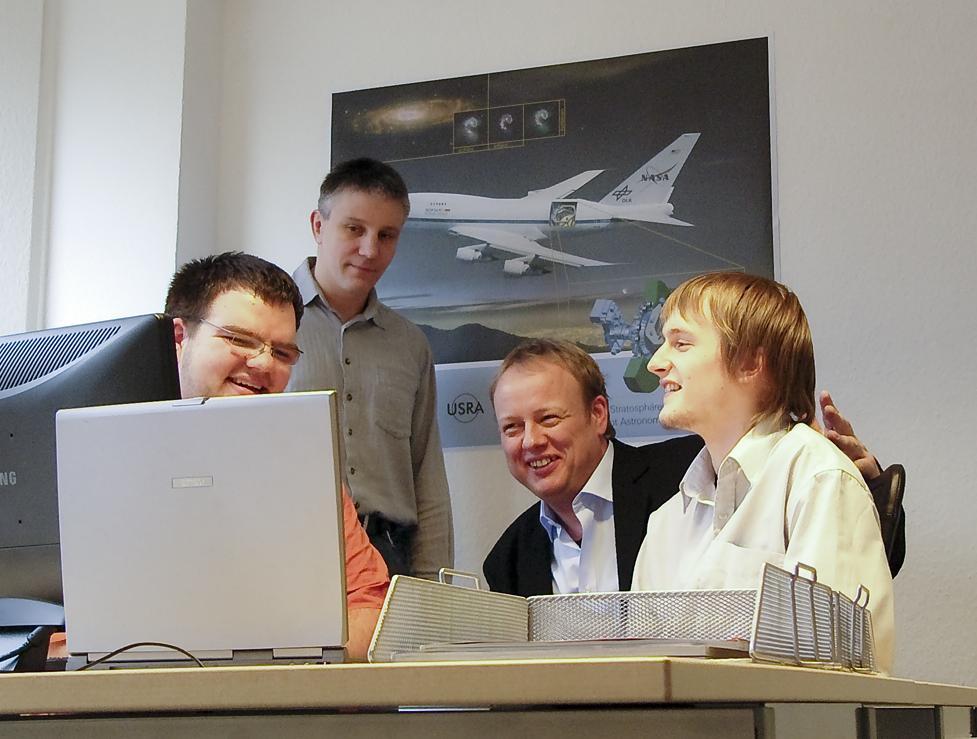
Fast drei Meter groß und 20 Tonnen schwer ist das Teleskop, das sich an Bord einer Boeing 747 befindet. Damit will die US-Raumfahrtbehörde NASA gemeinsam mit ihren Kollegen vom Deutschen Zentrum für Luft- und Raumfahrt (DLR) die Entstehung junger Sternen- und Planetensysteme beobachten; das Projekt wird auch als fliegende Sternwarte bezeichnet. Hierfür entwickelt das Oldenburger Unternehmen "erpwerk" derzeit eine Wartungs-Software. Den Auftrag hat ERPwerk am 13. Oktober 2008 erhalten.
"Mit unserer Software verwalten wir über 10000 Einzelteile für die Wartung der fliegenden Sternwarte", verdeutlicht ERPwerk-Geschäftsführer Ulf Klarmann die Tragweite der Aufgabe. Neben der Wartung soll die Software auch noch weitere Aufgaben für das gemeinsame Projekt von NASA und DLR erfüllen: Lagerverwaltung, Dokumentation, Bestellwesen und Projektverwaltung. "Die Software muss sich von jedem Punkt der Welt aus bedienen lassen", ergänzt Klarmann.
Nicht die NASA oder das Luft- und Raumfahrtzentrum sind an "erpwerk" herangetreten, sondern das Deutsche Sofia Institut (DSI). Es koordiniert für das DLR sowohl die Fertigstellung als auch den Betrieb der fliegenden Sternwarte "Sofia" (Stratosphären Observatorium für Infrarot-Astronomie) und hat seinen Sitz an der Universität Stuttgart.

"Für uns ist besonders wichtig, dass die Software eine ganzheitliche Lösung darstellt, welche die bereits vorhandene Infrastruktur berücksichtigt", erklärt Nadine Hanisch – beim Sofia-Institut für Logistik und Lagerverwaltung zuständig – welche Anforderungen die Software erfüllen muss. Weitere entscheidende Punkte waren, so Hanisch, die Schnittstellenkompatibilität und die Modularität der Software, die sich an zukünftige Prozesse anpassen und sich individuell auf "Sofia" zuschneiden lassen müsse.
Klarmann vermutet, dass auch die Kosten eine Rolle gespielt haben: "Wir kombinieren verschiedene fertige Softwarebausteine – so genannte Standardkomponenten – miteinander." So entstünden individuelle Lösungen auf Basis von open-source-Software. "Das ist in der Regel günstiger als fertige Software zu kaufen und sie dann an den Kundenwunsch anzupassen", erklärt Klarmann. Die Software soll noch in 2009 fertiggestellt und in Betrieb genommen werden.
Für dieses und weitere Projekte sucht Klarmann noch Personal. Programmierer mit Delphi-Kenntnissen können sich telefonisch unter der Nummer +49 441 777 729 oder unter der E-Mail-Adresse: kontakt@erpwerk.de direkt an Klarmann wenden.


